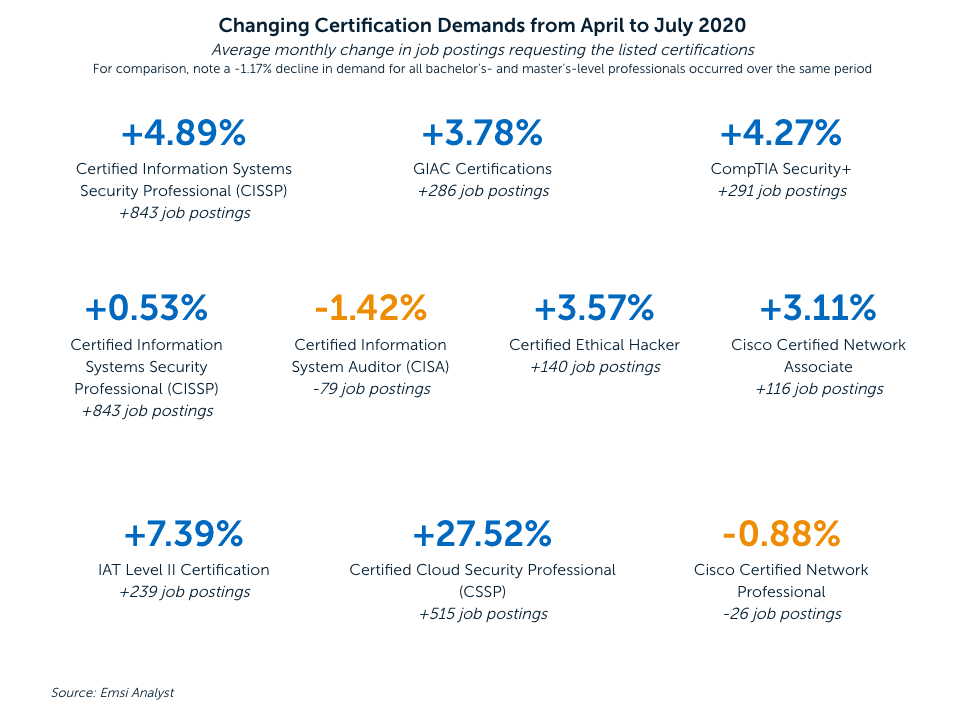Here’s how to meet growing demand for cybersecurity professionals
As topics like corporate cybersecurity breaches and election security continue to make headlines, it’s no wonder our researchers have seen an uptick in requests to assess employer demand for cybersecurity programs in recent years. Just this year, job postings for cybersecurity professionals increased 113% between January and June. And growth in cybersecurity job postings outpaced growth in almost every other field during that period. At the same time, the US has less than half the talent needed to fill open job positions.
-
113%
increase in job postings for cybersecurity professionals between January and June
So why is there such a large misalignment between supply and demand for cybersecurity professionals? Barriers associated with earning in-demand industry certifications are a key factor. Certified professionals earn about 25% more annually than their non-certified counterparts, meaning there is a clear financial benefit for professionals to earn a cybersecurity certification. However, in a cybersecurity workforce survey, nearly a third of the 3,237 surveyed professionals indicated that the cost of industry certifications and unclear career opportunities were barriers to earning certifications.
To overcome these challenges, administrators can prepare students in computer science, data analytics, and related technology programs to meet employer demand by aligning program curricula with in-demand cybersecurity certification requirements and helping students become industry certified. We identified top industry certifications in the COVID-19 disrupted-market and distilled three steps for adapting your data, technology, and cybersecurity programs to capitalize on skyrocketing demand for cybersecurity professionals.
1. Ensure program curriculum prepares students for top cybersecurity certifications
Your programs might already teach relevant cybersecurity skills but may need to be refreshed to align with certification requirements. To learn more about which cybersecurity certifications employers seek most, our researchers analyzed job postings from employers across the United States, ranging from Oracle to Deloitte. We found employers demonstrated the greatest demand for Certified Information Systems Security Professional (CISSP) certification, followed by demand for GIAC Certifications and CompTIA Security+.
While job postings across many fields dropped when local and state governments started issuing stay-at-home-orders, employer demand for bachelor’s- and master’s-level professionals with CISSP, GIAC, and CompTIA Security+ certifications increased at a much faster rate per month than overall employer demand between April and July 2020. This suggests programs should continue to prepare students for these certifications to help increase their job prospects.
Make data-informed decisions about your program portfolio
In addition to aligning program curriculum with these top three certifications, consider also preparing students for the Certified Cloud Security Professional (CCSP) certification. The CCSP certification had the fastest growth in employer demand between April and July 2020 (27.52% per month on average, or 515 new job postings per month on average).

2. Advertise employment opportunities and specific industry certifications to attract students
We know program marketing that emphasizes return-on-investment, such as job opportunities and earning potential, attracts prospective students of online, graduate, and adult education programs. To help recruit these students, highlight the salary benefits of earning industry certifications on your program websites and clearly identify which courses prepare students to test for which industry certifications.
How EAB is helping schools identify, recruit, and enroll adult learners
Attract Cybersecurity Students
-
Provide labor market demand data and student value stories to communicate program value
Update program websites with data and messaging on demand for cybersecurity certifications to educate prospective students on the program’s link to career opportunities and attract students focused on career outcomes.
- Example: Purdue Global University highlights its Online Bachelor of Science in Cybersecurity program prepares students to sit for industry certifications and advertises salary ranges and projected job growth for top jobs for program graduates.
-
Map coursework to industry certifications on program websites
Show students how the program will prepare them to earn valued industry certifications.
- Example: University of Maryland Global Campus specifies on its online Bachelor of Science in Computer Networks and Cybersecurity program website the courses which align with each of the 14 industry certifications listed, including the CISSP and CompTIA Security+ certifications. Purdue Global University also maps specific courses to industry certifications on its program website.
3. Create stackable credentials or opportunities to complete certifications during your program
The cybersecurity workforce study by (ISC) 2 found the cost of certifications to be the primary barrier to career advancement for cybersecurity professionals—and more than half of surveyed professionals pay out-of-pocket for some of the cost of industry certifications. Schools can lower the cost of certifications by offering exam vouchers or discounts, like at University of Maryland Global Campus, or embedding certifications into program completion for no additional cost or time commitment. For example, Western Governors University advertises that its online bachelor’s cybersecurity program includes 15 top cybersecurity certifications at no additional cost.
Design credentials to meet adult learners’ needs
In a market with many competitive computer science, data analytics, and technology-related programs, it’s not enough for your programs to just equip students with cybersecurity skills. Increasingly, students must signal their competencies to employers through industry certifications. Our researchers can help you understand competitors’ program design and marketing to evaluate your program’s readiness to meet the ever growing cybersecurity demand.

More Blogs

The big bets that actually drive online enrollment growth

How to use state demand data to launch or revitalize programs
